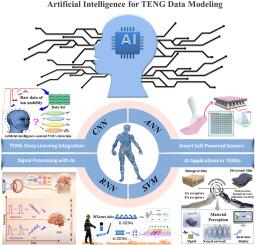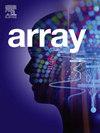Artificial Intelligence for data modeling in triboelectric nanogenerators
IF 4.5
Q2 COMPUTER SCIENCE, THEORY & METHODS
引用次数: 0
Abstract
This review presents a comprehensive study on the integration of Artificial Intelligence (AI) with Triboelectric Nanogenerators (TENGs), emphasizing their convergence in advancing real-time sensing, signal interpretation, and self-powered systems. Over 20 experimental implementations are analyzed, combining AI models such as Convolutional Neural Networks (CNN), Recurrent Neural Networks (RNN), Support Vector Machines (SVM), and Long Short-Term Memory (LSTM) networks with TENGs across multiple operational modes including contact-separation, lateral sliding, and freestanding configurations. Application cases discussed include AI-powered triboelectric smart socks achieving 96.67 % activity recognition accuracy, soft robotic grippers with 98.1 % object identification precision, and wearable pulse sensors for continuous blood pressure monitoring using personalized machine learning algorithms. Quantitative analyses of machine learning frameworks are presented, with CNNs and ANNs demonstrating up to 99.32 % accuracy in TENG signal processing tasks. Deep learning techniques are shown to enhance noise filtering, feature extraction, and adaptive feedback, transforming TENGs into intelligent platforms for healthcare, robotics, IoT systems, and smart environments. The review also addresses key challenges such as data variability, environmental robustness, and algorithmic scalability, and future directions in hybrid energy systems, adaptive algorithms, and cross-disciplinary collaboration for sustainable, intelligent sensing technologies.

摩擦学纳米发电机数据建模的人工智能
本文综述了人工智能(AI)与摩擦电纳米发电机(TENGs)集成的综合研究,强调了它们在推进实时传感、信号解释和自供电系统方面的融合。本文分析了20多个实验实现,将卷积神经网络(CNN)、循环神经网络(RNN)、支持向量机(SVM)和长短期记忆(LSTM)网络等人工智能模型与TENGs结合起来,跨越多种操作模式,包括接触分离、横向滑动和独立配置。讨论的应用案例包括人工智能驱动的摩擦电智能袜子,其活动识别精度为96.67%,软机器人抓取器的物体识别精度为98.1%,以及使用个性化机器学习算法进行连续血压监测的可穿戴脉搏传感器。提出了机器学习框架的定量分析,cnn和ann在TENG信号处理任务中显示出高达99.32%的准确率。深度学习技术可以增强噪声过滤、特征提取和自适应反馈,将TENGs转变为医疗保健、机器人、物联网系统和智能环境的智能平台。该综述还讨论了数据可变性、环境鲁棒性和算法可扩展性等关键挑战,以及混合能源系统、自适应算法和可持续智能传感技术的跨学科合作的未来方向。
本文章由计算机程序翻译,如有差异,请以英文原文为准。
求助全文
约1分钟内获得全文
求助全文

 求助内容:
求助内容: 应助结果提醒方式:
应助结果提醒方式:


